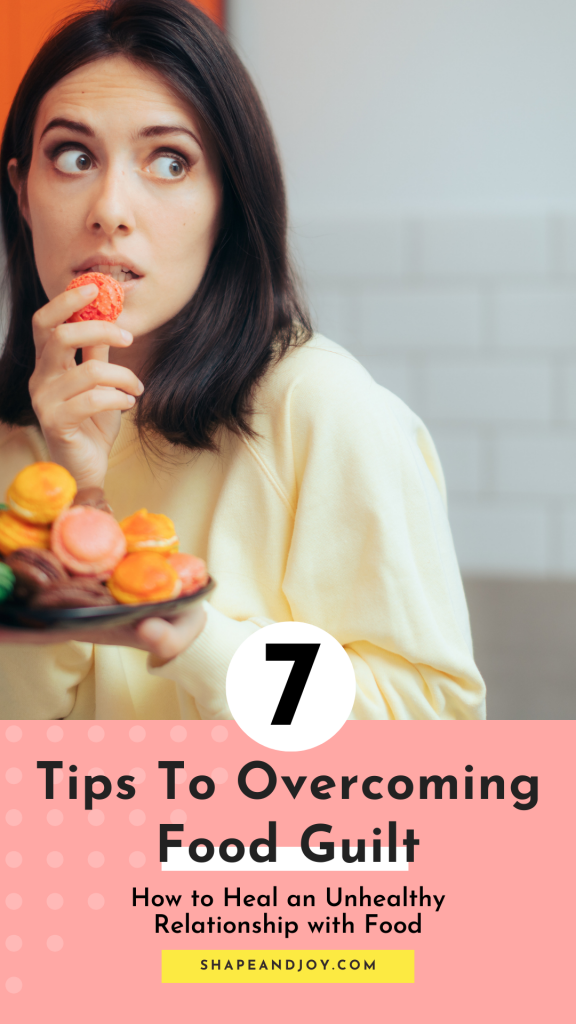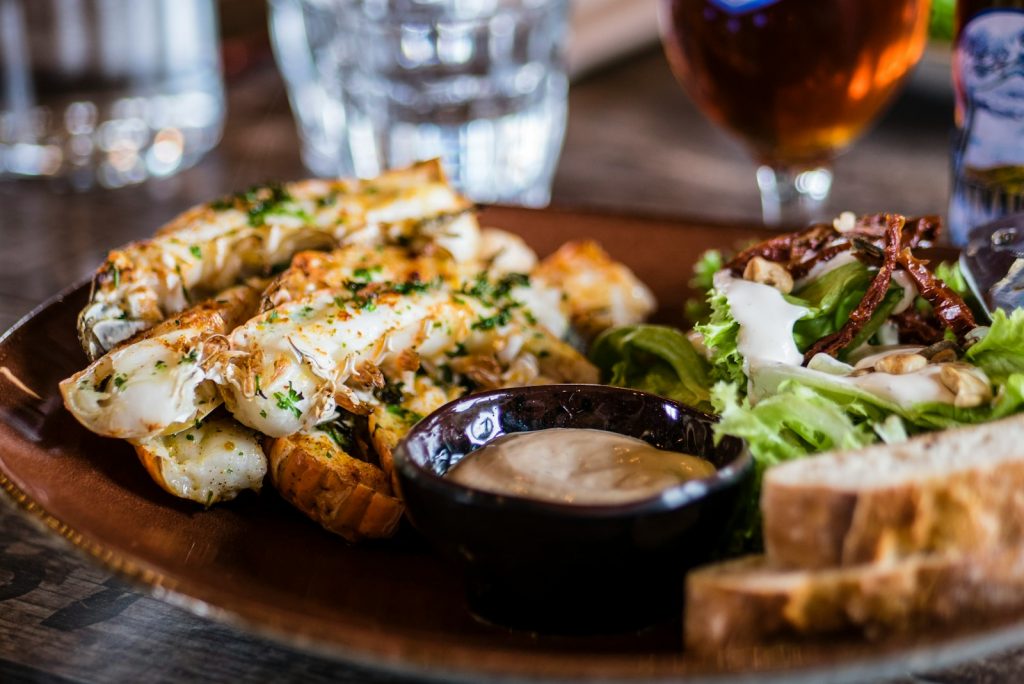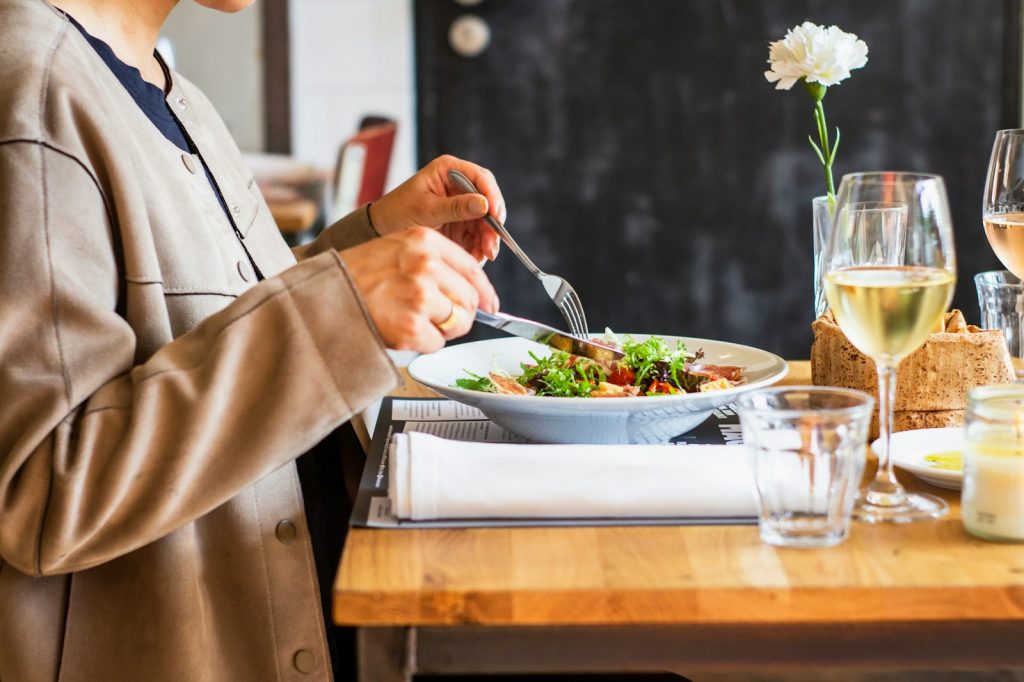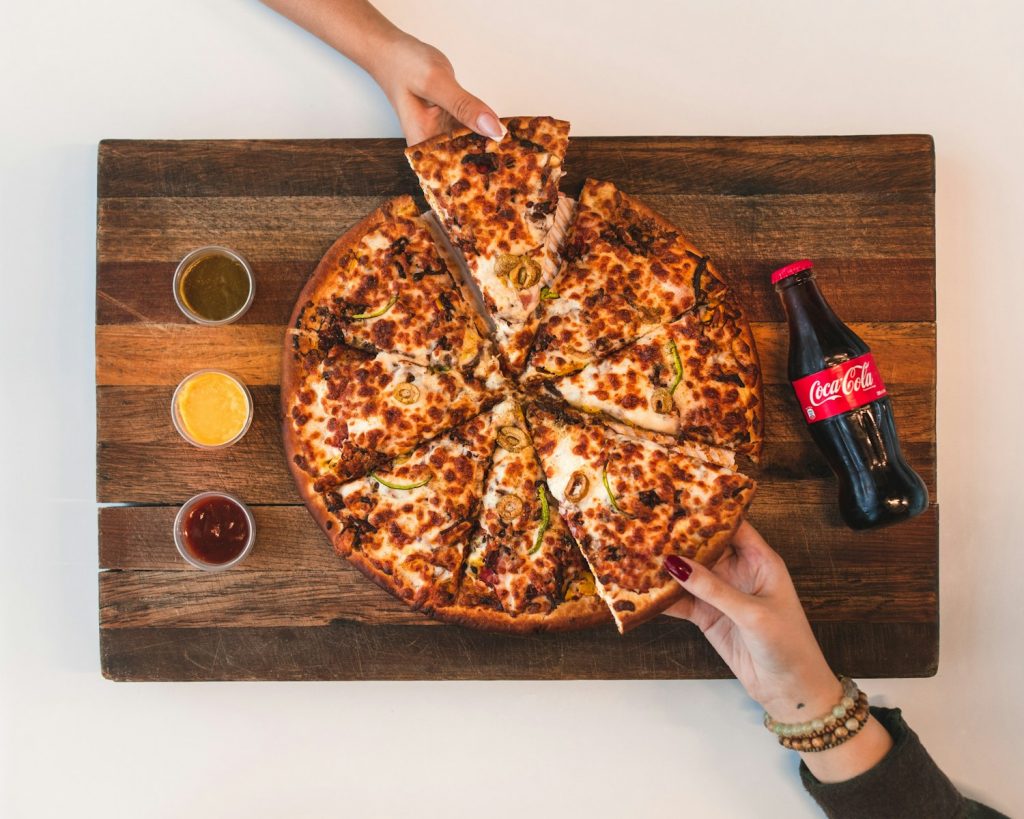This post may contain affiliate links, which means that I may earn a commission if you click on the link, with no cost for you. It’s one of the ways I support my blog. You can read more about this here.
Introduction
Have you ever felt guilty about that slice of cake or a second helping of your favourite pasta? Then, you are not the only one! Most of us are plagued by this nagging voice in our heads that brings out feelings of guilt after we have the foods that we love. This could mean you have an unhealthy relationship with food or in this case specifically, food guilt.
But the good news is: that you absolutely can get over food guilt. This post covers seven tips to make food guilt a thing of the past and your relationship with food a healthier, happier one. Whether you struggle with labelling foods as “good” or “bad,” have a hard time finding balance in your diet, or just really want to enjoy your meals without a feeling of regret.
LEARN THE BEST WAY TO STAY CONSISTENT WITH EXERCISE > Enjoy Movement: How To Find Fun In Every Workout

Understanding Food Guilt And An Unhealthy Relationship With Food
Food guilt feels like that sinking feeling of remorse or discomfort that most of us have after eating certain kinds of food. It is that voice inside one’s head which says, “You shouldn’t have eaten that” or “You’ve just messed up your diet.” Very often, this kind of guilt arises out of the kind of pressure that society—or sometimes one’s own self—exerts in relation to what is “healthy” or “unhealthy” food intake. On any given day, it might mean second-guessing food choices or being anxious after meals. Sometimes, it is even a form of self-punishment in the sense of drastically reducing food intake or increasing exercise.
Common Triggers
- Indulgence: Whether it’s a slice of cake at a birthday party or a few biscuits before bed, enjoying treats can often lead to feelings of guilt, especially if they’re viewed as “off-limits” or “bad.”
- Overeating at Social Events: Social events like family dinners, holidays, or nights out can lead to “overeating”, which might trigger guilt afterwards.
- Breaking Diet Rules: Deviating from a meal plan by missing a workout or eating food that doesn’t work with your plan, may bring feelings of food guilt.
- Emotional Eating: Turning to food for comfort during stressful or emotional times can leave you feeling guilty.

Impact on Well-being
Food guilt doesn’t just affect our mood—it has real consequences for our mental and physical health. Constantly feeling guilty about eating can lead to disordered eating patterns, like binge eating or emotional eating. It can harm our body image and make us overly critical of ourselves. Over time, this can contribute to anxiety, depression, and an unhealthy relationship with food. That’s why it’s so important to address food guilt to develop a healthier approach to eating.
POSTS YOU MAY BE INTERESTED IN:
- How To Stop Thinking About Food: Stop Obsessing, Start Enjoying!
- Unconditional Permission To Eat For Sustainable Weight Loss
- Yo-Yo Dieting – How To Stop: A Guide To Sustainable Weight Loss
1. Practice Mindful Eating
If you’ve read any of my other posts, you’ll know I am a huge advocate for mindful eating. Mindful eating is all about being present and fully engaged when you’re eating. It’s about savouring each bite, appreciating the flavours, and listening to your body’s hunger and fullness cues. This practice helps create a healthier relationship with food by reducing the urge to overeat and decreasing food guilt. When we eat mindfully, we’re more likely to make better food choices and enjoy our meals without distraction or judgment.

How to Practice Mindful Eating:
- Savour Each Bite: Take time to really enjoy your food. Notice the textures, flavours, and smells. Eating slowly helps you appreciate your meal and recognise when you’re full.
- Pay Attention to Hunger Cues: Before you eat, ask yourself if you’re genuinely hungry. During your meal, pause occasionally to check in with your hunger levels. Stop eating when you’re comfortably full, not stuffed.
- Get Rid of Distractions: Try to eat without distractions like TV, phones, or computers. This means you will be able to focus on your meal and be more aware of what and how much you’re eating.
- Appreciate Your Food: Think about where your food comes from and the effort that went into preparing it. Gratitude can enhance your eating experience and allow you to focus less on guilt and more on appreciation.
- Listen to Your Body: Your body knows what it needs. But if you have been a chronic dieter, you may have stopped listening to it or trusting what you need. But you need to start learning to trust your body. If you’re craving a specific food, allow yourself to enjoy it without guilt. Mindful eating is about balance and listening to your body’s needs.
RECOMMENDED READING:
- The Joy of Half A Cookie by Jean Kristeller: A guide to mindful eating that helps readers enjoy food without overindulging or feeling guilty.
2. Ditch the “Good” and “Bad” Labels
Labelling foods as “good” or “bad” can contribute to an unhealthy relationship with food and impact your mental health. When we categorise foods this way, we set ourselves up for feelings of guilt and failure whenever we eat something we’ve labelled as “bad.” This black-and-white thinking can lead to a cycle of restriction and binge eating, making it difficult to maintain a healthy, balanced diet.

Instead of viewing foods as “good” or “bad,” try to see all foods as part of a balanced diet. Every food has a place in our lives, and it’s okay to enjoy a mix of foods in moderation. Here are some ways to try a more positive approach:
- Practice Moderation: Focus on eating a mix of different foods in reasonable portions. It’s perfectly fine to enjoy a slice of cake or extra chips occasionally! Balance is key.
- Nourish Your Body: Think about how different foods make you feel. Some foods give you energy and nutrients, while others might give you comfort and joy. Both types are important for overall well-being.
- Remove Judgment: Recognise that one meal or snack doesn’t define your eating habits. It’s the overall pattern that matters.
- Educate Yourself: Learn about nutrition and how different foods contribute to your health. This can help you appreciate all foods without labelling them.
3. Listen to Your Body
Your body knows what it needs, and by listening to it, you can avoid overeating or undereating. This awareness helps you make better food choices and reduces the likelihood of experiencing food guilt. We’ve touched on mindful eating already, and listening to your body is a key component of that practice.

Tips to Practice Intuitive Eating:
- Check-in with Yourself: Before eating, take a moment to assess your hunger levels. Are you physically hungry, or are you eating out of habit, boredom, or emotion? A simple check-in can help you eat more intentionally.
- Rate Your Hunger: Use a hunger scale from 1 to 10, with 1 being extremely hungry and 10 being uncomfortably full. Aim to eat when you’re at a 3 or 4 (moderately hungry) and stop when you’re at a 6 or 7 (comfortably satisfied).
- Slow Down: Eating slowly gives your body time to send fullness signals to your brain. Put down your fork between bites, chew thoroughly, and savour each bite as part of mindful eating.
- Pause During Meals: Halfway through your meal, pause and check in with your hunger and fullness levels. This can help you decide if you need to keep eating or if you’re satisfied.
- Recognise Emotional Eating: Sometimes we eat in response to emotions rather than physical hunger. If you find yourself eating when you’re stressed, anxious, or bored, try to address the emotion in a non-food way, like taking a walk, calling a friend, or practising deep breathing.
- Understand the Impact of Diets: Long-term dieting and food restrictions can dull your ability to recognise natural hunger and fullness cues. Diets often teach us to ignore our bodies, focusing instead on external rules. Over time, this disconnect can make it harder to trust your body’s signals.
- Trust Your Body: Your body is your best guide. Trust its signals and respond with nourishing choices. Remember, it’s okay to enjoy all types of food in moderation without guilt.
POSTS YOU MAY BE INTERESTED IN:
4. Focus on Nutritional Value, Not Calories
As someone who recommends calorie counting, even I can recognise that it can potentially create an unhealthy relationship with food. It can become really easy to caught up in counting calories. However, focusing solely on calorie content can lead to an unhealthy relationship with food and contribute to food guilt. Instead, prioritise the overall nutritional value of foods, which has a huge impact on satiety – the feeling of fullness and satisfaction. Understanding nutrition and satiety helps you make food choices that keep you full longer and reduce overeating without thinking about it too much. Adopt the 80/20 approach: aim for 80% of your diet to be nutrient-dense foods and 20% to include your favourite treats, promoting balance without deprivation.
POSTS YOU MAY BE INTERESTED IN:
5. Find Joy in Movement
Regular physical activity plays a crucial role in improving your relationship with food and reducing food guilt. Exercise helps regulate hunger hormones, increases energy levels, and enhances overall mood. When you find joy in movement, you’re more likely to make balanced food choices and feel less guilty about occasional indulgences. Exercise isn’t just about burning calories—it’s about feeling good and supporting your mental and physical health.
POSTS YOU MAY BE INTERESTED IN:
6. Develop a Positive Mindset
Overcoming food guilt starts with a change in mindset. Positive thinking and self-compassion can change how you view food and your eating habits. By working towards a positive mindset, you can begin to break away from the cycle of guilt and embrace a more balanced relationship with food.
Affirmations, while not for everyone, can be powerful tools that may help reframe negative thoughts about food and promote self-compassion. I have some posts on affirmations and the science behind them if you want to learn more, but here are some to get you started:

- “I honour my body and its needs.”
- Remind yourself that listening to your body’s signals is a form of self-care.
- “All foods can fit into a balanced diet.”
- Emphasize the importance of variety and moderation rather than restriction.
- “I am allowed to enjoy my favourite foods without guilt.”
- Give yourself permission to enjoy the foods you love without negative feelings.
- “I trust my body to guide me in making healthy choices.”
- Reinforce your confidence in your ability to make decisions.
- “I am more than my food choices.”
- Acknowledge that your worth is not determined by what you eat.
- “I release the need to be perfect and embrace balance.”
- Let go of the pursuit of perfection and focus on finding a healthy balance.
- “I forgive myself for past mistakes and move forward with compassion.”
- Practice self-forgiveness and commit to a positive path ahead.
7. Seeking Support For An Unhealthy Relationship With Food
Having a strong support system is essential in overcoming food guilt and fostering a healthy relationship with food. Whether it’s friends, family, or a professional, having people to talk to can make a significant difference. Support systems provide encouragement, understanding, and practical advice, helping you navigate your journey toward a guilt-free approach to eating.

- Friends and Family: Share your struggles and goals with trusted loved ones. They can offer emotional support and help you stay accountable.
- Support Groups: Join local or online support groups where you can connect with others facing similar challenges. Sharing experiences and tips can be incredibly empowering.
- Counselling: Consider seeking help from a registered dietitian, therapist, or counsellor specialising in eating disorders or disordered eating. Professional guidance can provide personalised strategies and support.
- Online Communities: Join online forums or social media groups focused on healthy eating and body positivity. These communities can offer a wealth of information, inspiration, and camaraderie.
- Educational Resources: Read books, listen to podcasts, or watch videos by experts in nutrition and mental health. Learning more about intuitive eating, diet culture, and body positivity can help you reframe your mindset.
- Mindfulness and Meditation Apps: Apps like Headspace or Calm offer guided meditations and mindfulness exercises that can help you manage stress and improve your relationship with food.
Unhealthy Relationship with Food: Conclusion
Remember, it’s okay to enjoy food without guilt. Food is meant to nourish both your body and soul, and you deserve to enjoy it. You have the power to change your relationship with food, embracing a mindset of self-compassion and positivity. Take these tips to heart and know that every step you take toward a guilt-free approach to eating is a victory worth celebrating.
We’d love to hear from you! Share your experiences, additional tips, or any thoughts you have in the comments section below. Your insights can help foster a sense of community and support for others on the same journey. Let’s create a space where we can all learn, grow, and support each other in moving away from an unhealthy relationship with food.
References
- “Associating a prototypical forbidden food item with guilt or celebration: Relationships with indicators of (un)healthy eating and the moderating role of stress and depressive symptoms” – Kuijer et al., 2015
- “Guilty or not? Feelings of guilt about food among college women” – Steenhuis, 2009
- “Relationship of perceived macronutrient and caloric content to affective cognitions about food in eating-disordered, restrained, and unrestrained subjects” – Sunday et al., 1992
- “The effect of food on mental health” – Constantin & Fonseca, 2020
- “Food and mood: how do diet and nutrition affect mental wellbeing?” – BMJ, 2020
- “Chocolate cake. Guilt or celebration? Associations with healthy eating attitudes perceived behavioural control, intentions and weight-loss” – Kuijer & Boyce, 2014
- “The meaning of guilt and shame: a qualitative study of mothers who suffer from eating difficulties” – Rørtveit et al., 2010
- “A Meta-Analysis of the Effectiveness of Guilt on Health-Related Attitudes and Intentions” – Xu & Guo, 2018

